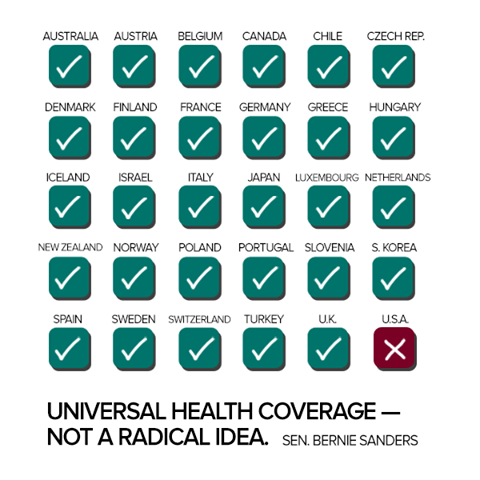 It’s less than two weeks before election day and it’s just been announced that Obamacare premiums are increasing significantly next year. In a normal election cycle this would have been the October surprise that could have sunk the Clinton campaign, but Donald Trump has already damaged his own campaign so much that it’s likely to make little difference to the final result.
It’s less than two weeks before election day and it’s just been announced that Obamacare premiums are increasing significantly next year. In a normal election cycle this would have been the October surprise that could have sunk the Clinton campaign, but Donald Trump has already damaged his own campaign so much that it’s likely to make little difference to the final result.
However, it’s a headline that people will remember and most don’t process the nuances: that subsidies will also increase, that this doesn’t affect most people, that premiums are increasing at a slower rate than they used to, and approximately 77% of Obamacare recipients will still be able to get ‘Silver’ packages for less than US$100 per month (which hasn’t changed since Obamacare started). Those people who will be affected by increased premiums are those at the upper end of the income range who are more likely to be able to afford them anyway.
 Donald Trump also proved he’s an imperfect messenger for his party on this issue. In the past he’s praised the healthcare systems in both Canada and Scotland (which both have single-payer systems) and has said he doesn’t want anyone to be without healthcare. Further, following the announcement of the increases, he was immediately out on the campaign trail complaining about how his own employees were having a “terrible” time “because of Obamacare.” They’re not: he provides the insurance for at least 90% of his employees so they’re not affected by this.
Donald Trump also proved he’s an imperfect messenger for his party on this issue. In the past he’s praised the healthcare systems in both Canada and Scotland (which both have single-payer systems) and has said he doesn’t want anyone to be without healthcare. Further, following the announcement of the increases, he was immediately out on the campaign trail complaining about how his own employees were having a “terrible” time “because of Obamacare.” They’re not: he provides the insurance for at least 90% of his employees so they’re not affected by this.
Barack Obama signed the Patient Protection and Affordable Care Act (Obamacare) into law on 23 March 2010. According to Wikipedia:
The Affordable Care Act was intended to increase health insurance quality and affordability, lower the uninsured rate by expanding insurance coverage and reduce the costs of healthcare… The law requires insurers to accept all applicants, cover a specific list of conditions and charge the same rates regardless of pre-existing conditions or sex.
The law fixed much that was broken about healthcare in the United States. Issues included the fact that tens of millions of people couldn’t afford access to a doctor, many were refused coverage by insurance companies because of pre-existing conditions (including conditions they were born with), and tens of thousands went bankrupt because of the cost of healthcare even when they had insurance.
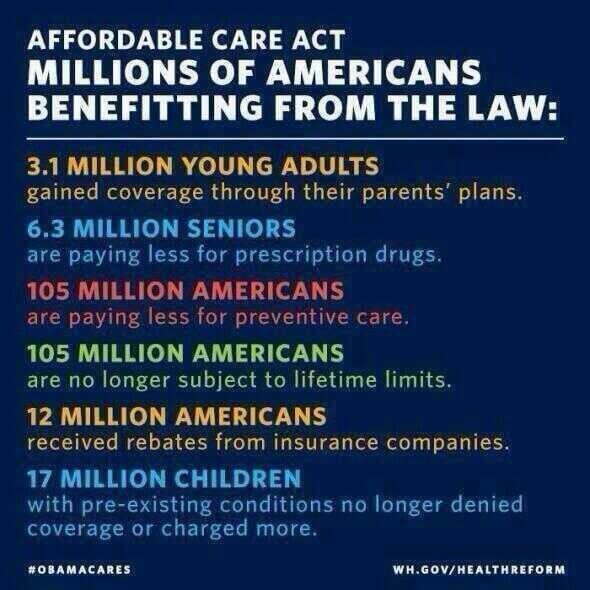
In the United States whether or not you have healthcare was, and often still is, attached to your employment status. Large employers (more than 50 employees) are required to provide health insurance as part of employment packages, but many others do too in order to attract and retain the best people. This is fine for people who have jobs but often also has a stifling effect on job mobility and satisfaction, especially if you or a family member has an ongoing health issue.
It’s also has a stifling effect on economic growth. It prevents wages from increasing because wage rises are taken up by increases in health insurance premiums when considered as part of the whole package, and employers would rather pay health insurance costs than wages because they are tax deductible. Research by Katherine Baicker and Amitabh Chandra of Harvard University found that the last twenty years have seen both the lowest increase in wages and the highest increase in premiums. (Leonhardt, Kindle Locations 470-480)
The number of people with health insurance has increased markedly since the introduction of Obamacare. At the end of last year the number of uninsured was estimated to be only 11.9% of the population. That’s a great improvement, but it still means around 40 million people don’t have access to the sort of healthcare everyone else in the developed world takes for granted.
Healthcare is an area in which the political divide is stark in the United States. Unlike most developed nations where quality healthcare is seen as a basic human right, many in the United States see it as a privilege you have to earn by hard work. The idea of equal access to quality healthcare for everyone is one that has been a leftist fringe idea and has only become more widely accepted even amongst liberals in the last twenty years or so.
In the last couple of days, I’ve lost count of the number of times I’ve heard Republicans complaining about their taxes subsidizing the cost of healthcare for those less fortunate than them. (I guess it doesn’t count that their employer gets a tax rebate for paying their insurance premiums, so all the people who are paying tax but have no insurance are subsidizing them already.)
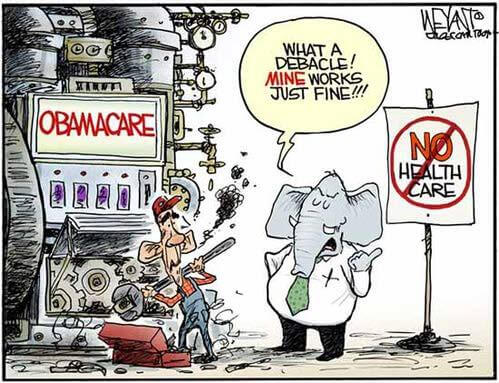 The strong libertarian streak in the USian psyche has meant the right reject universal coverage instinctively. It’s difficult to work out exactly how many times the Republicans have tried to repeal Obamacare aince 2010, but it’s at least 62! Instead, they could have been working with Democrats to fix it. In fact, Republicans will insist that pre-Obamacare, the US system was just wonderful, they have the best healthcare in the world, and everyone is coming to their country to get care. At the same time, they’re constantly willing to pick holes in the systems of other countries.
The strong libertarian streak in the USian psyche has meant the right reject universal coverage instinctively. It’s difficult to work out exactly how many times the Republicans have tried to repeal Obamacare aince 2010, but it’s at least 62! Instead, they could have been working with Democrats to fix it. In fact, Republicans will insist that pre-Obamacare, the US system was just wonderful, they have the best healthcare in the world, and everyone is coming to their country to get care. At the same time, they’re constantly willing to pick holes in the systems of other countries.
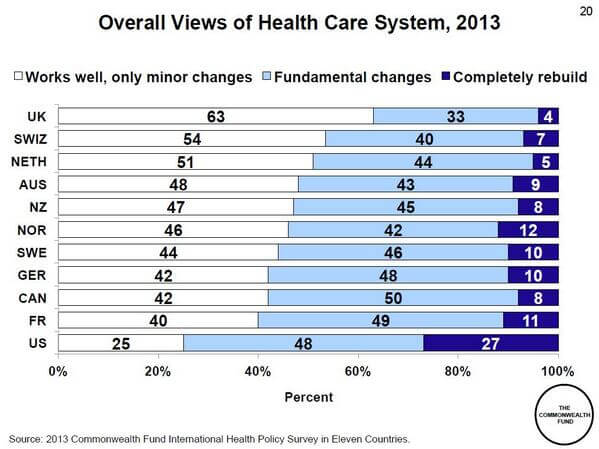
Except for Norway, which provides extremely generous benefits such as 46 weeks parental leave at 100% of pay (or 56 weeks at 80% pay) of which up to 14 weeks can be taken by the second parent, no other country spends anywhere near as much per capita as the United States:
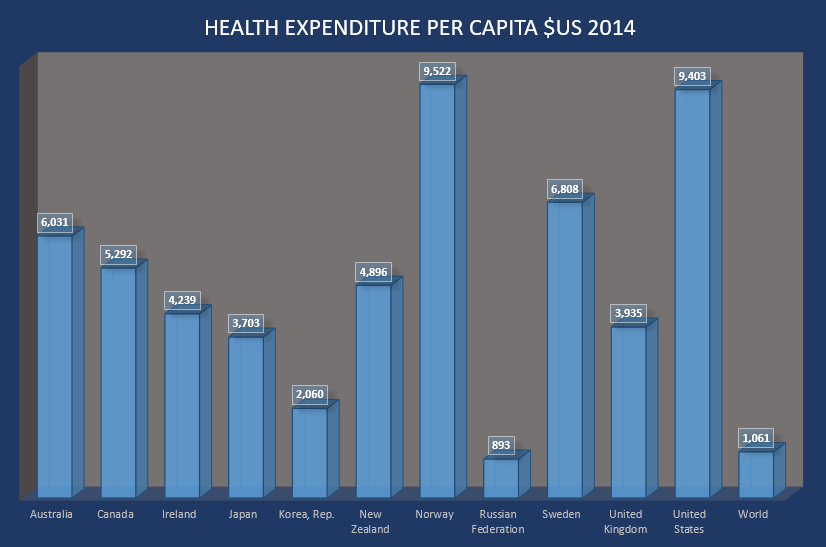
For this extra expenditure, you’d expect that the health of the population would be better than that of everyone else, but it’s not. New Zealand, Australia, Canada, Japan, South Korea, France, Germany, the United Kingdom, Sweden, Norway, and others all have a significantly higher (at least a year more) life expectancy than the the United States. Because so many poor people don’t have adequate health care, the United States has the highest infant mortality rate in the OECD. The United States does do better than most in the survival rates for some cancers, but even there, New Zealand, for example, does better in several paediatric cancer survival rates.
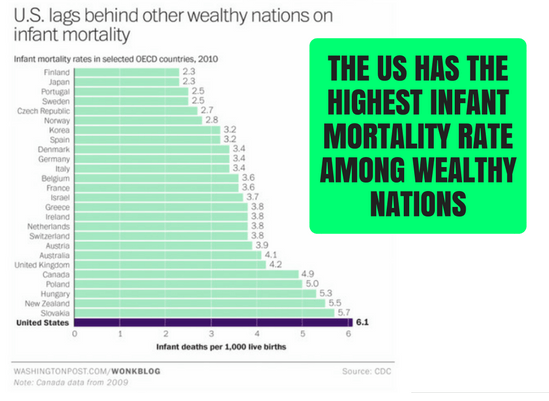
During the current election campaign, the Republican mantra has been that they will “repeal and replace Obamacare” though I have heard no concrete ideas of what they would replace it with except a few mutters about health insurance accounts. Health insurance accounts are all very well if you are young and healthy, and remain relatively healthy your whole life, but they are not a solution. They are, in my opinion, a typically selfish idea of the type that regularly spews from the Libertarian party and only sound good if you don’t think about them deeply or don’t care about your fellow citizens.
In the meantime, repealing the legislation would mean that tens of millions of people who are either too poor to afford health insurance without help, or one of the 25 million (including 17 million children) too sick for insurance companies to be interested in, will be dumped back on the scrapheap by the party that constantly trades on its Christian values.
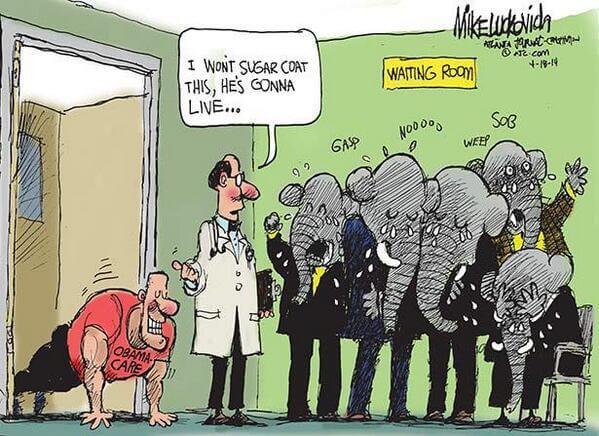 There’s no doubt that Obamacare isn’t perfect, and reform is needed. The cost of healthcare has continued to rise and in some states the public has only one insurance option. It really is time though that the Republicans began to accept that Obamacare isn’t going anywhere and they cooperate with the Democrats to find a path forward.
There’s no doubt that Obamacare isn’t perfect, and reform is needed. The cost of healthcare has continued to rise and in some states the public has only one insurance option. It really is time though that the Republicans began to accept that Obamacare isn’t going anywhere and they cooperate with the Democrats to find a path forward.
A lot of the talk from Republicans has been that what Democrats wanted all along was a single-payer system, and that they deliberately designed a flawed system to make that possible. I think it’s probably true that many Democrats wanted a single-payer system, but many of the problems with the system that was eventually implemented are because they made changes to the original Bill to try and get Republicans to support it. They never received that support, but the changes remained.
In my opinion it’s about time all USians began to look at implementing a single-payer system in their country. The topic doesn’t appear to have ever been seriously debated in the United States and as a result there is little understanding of what it would mean. (And at the risk of sounding like a conspiracy-theorist, I think industry lobbyists have got a lot to do with that.) However, there is a good reason almost all developed countries have universal health coverage – it’s better. The systems in each country are different and none are perfect, but they are all an improvement on what the United States has currently.
There are several aspects that need to be looked at. Firstly, there’s the issue of separating healthcare provision from employment, which is a major economic benefit of a single-payer system. There are multiple reasons for this:
1. An employer is more likely to take on a new employee if he or she doesn’t have to worry about the hassle of arranging health insurance and the additional cost of providing health insurance.
2. The work force as a whole is more dynamic and more likely to be employed in roles that suit them and their talents best if their healthcare remains consistent whatever their employment status. It takes a certain amount of power away from employers too, and thus makes employment contract bargaining slightly more balanced.
3. There is no barrier to increasing an employee’s hours, or changing their status to make their employment more secure as doing so adds no extra costs related to providing health insurance.
4. The cost of health insurance is not a barrier to a business increasing in size, making expansion more likely.
5. The provision of health insurance doesn’t give large companies an advantage in hiring employees, so smaller employers are on a more equal footing when it comes to attracting the best. Therefore, smaller businesses have a better chance both of growth and success.
6. Smaller and more rural states have a better chance of retaining their people and attracting new ones because healthcare becomes more evenly available. Thus the divide between rural and urban states will reduce. Currently in New Zealand the regions are experiencing stronger economic growth than the cities. This is for a variety of reasons, but quality healthcare is not a barrier to this as it is available wherever you live. For example, every GP is required to have arrangements in place for their patients to be seen out of hours.
7. The cost of healthcare will reduce for all because the whole population will be involved in paying for it via their taxes. Obamacare said there’d be reductions, but this relied on people recognizing that taking out health insurance was the responsible thing to do and failed to recognize that people don’t always act in their own best interests. They build beautiful new homes in the tornado belt, each trying to out-compete their neighbours, then are killed because they failed to spend $20 thousand less on impressing others and including a storm cellar instead.
 Secondly, universal coverage is better for the whole economy. Again, there are many reasons:
Secondly, universal coverage is better for the whole economy. Again, there are many reasons:
1. Society as a whole is healthier, which improves the output of the economy, reduces crime, and increases overall well-being.
2. As everyone has access to primary healthcare, people do not wait until they are so sick they need to attend the Emergency Room at the hospital. Taking care of problems at an early stage is much cheaper for everyone, and also means people spend more time in work or education.
3. Policy makers can focus on prevention issues which have long-term benefits for the country. One of the things the New Zealand government (whichever party is leading it) has been working on for some time is to stop smoking by 2025. Long-term, this both improves the health of all and reduces healthcare costs. Another is teaching primary school children how to grow and prepare their own food. This is of course a very long-term strategy that will not have benefits for many years.
4. Employers have access to a healthier pool of workers, that they can rely on to stay healthy for longer.
5. People are less stressed because they don’t have to worry about what will happen to them if something goes wrong. They know quality healthcare is available to them.
6. A population that is better looked after when it is younger will be healthier when it is older, thereby reducing the inevitable cost of looking after the elderly. This is particularly true because those who can’t afford health insurance are those that are more likely to be less healthy and therefore cost more as they age.
7. Because they don’t have to worry about affording healthcare, people are more likely to take the risk of starting a new business. Small businesses are the lifeblood of any economy, and making it easier to start a business is a boon to any economy.
There are other issues too with a system set up the way it is in the United States. At the moment there is little or no incentive for healthcare providers to look at cutting costs or increasing efficiency. (Having said that, there are some who are doing good work in this ares.) Hospitals and other health providers put their costs up, insurance companies pay the extra, and those costs are passed on in the form of increased insurance costs. The cost of healthcare has been consistently and significantly ahead of inflation for decades. Some of this is due to things like technological advances and the availability of new treatments, but much of it is not.
This is because in reality people have little or no choice when it comes to health provision. They just do what the medical professionals tell them and pay the bill. The prevailing wisdom from the right is that the market is the best model to sort out these issues, but it’s not a valid one when it comes to health. In reality, people don’t have a choice, and when they are ill they are often not able to make that choice.
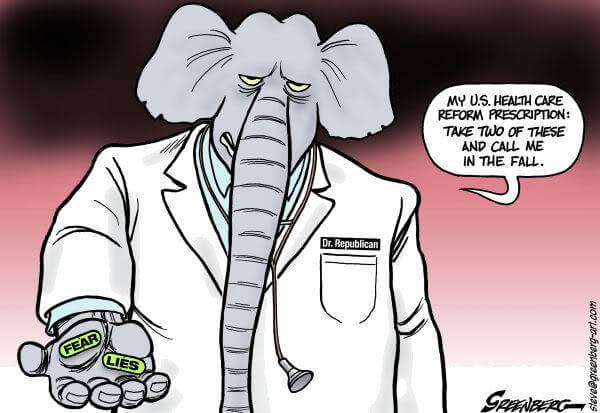 Drug costs are also an issue in the United States. In California, the ballot this election includes Proposition 61, which prevents the state paying any more for drugs than what the Department of Veteran’s Affairs (VA) pays. The VA negotiates its drug costs in the same way that Pharmac does in New Zealand. This means that the VA pays by far the lowest cost for drugs in the United States. Drug companies have donated over US$100 million to campaigns in just this one state to oppose Proposition 61. There has been a lot of what looks like misinformation to me in relation to this issue in California. As a result, groups like Veterans of Foreign Wars have come out in strong opposition to the Proposition because they have been convinced that it will increase drug costs for veterans. This is just one example of how those with a stake in maintaining their profits muddy the information water.
Drug costs are also an issue in the United States. In California, the ballot this election includes Proposition 61, which prevents the state paying any more for drugs than what the Department of Veteran’s Affairs (VA) pays. The VA negotiates its drug costs in the same way that Pharmac does in New Zealand. This means that the VA pays by far the lowest cost for drugs in the United States. Drug companies have donated over US$100 million to campaigns in just this one state to oppose Proposition 61. There has been a lot of what looks like misinformation to me in relation to this issue in California. As a result, groups like Veterans of Foreign Wars have come out in strong opposition to the Proposition because they have been convinced that it will increase drug costs for veterans. This is just one example of how those with a stake in maintaining their profits muddy the information water.
Real people are suffering every day in the United States because of the failure of her politicians to address this issue. It’s not going away, and it’s not going to get any easier. Policy makers have the advantage of being able to look at several models around the world and choosing the best bits from each to design an exceptional American system. For the sake of her population, let’s hope they find the courage.
Reference (and highly recommended)
Leonhardt, David. Here’s the Deal (Kindle Single). Byliner Inc.. Kindle Edition.
If you enjoyed reading this, please consider donating a dollar or two to help keep the site going. Thank you.

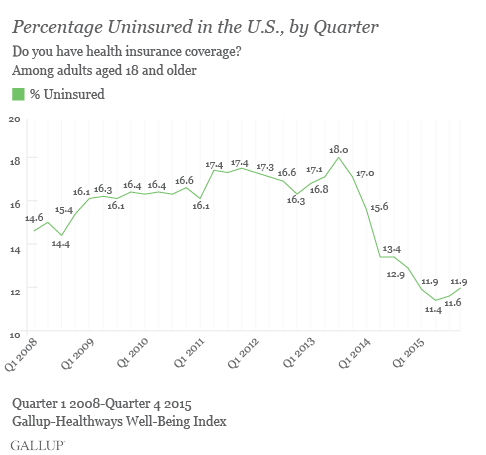
Healthcare in the US is one of the two major issues that I simply can’t get my head around (I don’t want to derail the thread by mentioning the other one). To the rest of the world it is so obvious that universal healthcare, free at the point of use, is a human right. You have helpfully added a large list of other less obvious benefits, making the concept even more of a no-brainer. When will they ever learn…
HaggisForBrains:
Transparent much? Let me guess…gun ownership. Well…I’m one of a growing number of libertarians who don’t think that socialized medicine is necessarily the end of the world. Yes, even the dreaded “single-payer,” which I would hope we can all agree is a bit of a misnomer.
These days, we’re more concerned with issues like the fact that the major parties can’t seem to produce any candidates at all who ever met a war they didn’t like, or aren’t such corporate tools.
So there are a lot of things that I’m willing to work with “progressives” on, or Greens, or anyone else making sense.
But I’m still going to be a gun collector. Sorry if that’s a deal-breaker.
If they ever want to get anywhere, the Libertarians are going to have to come up with better candidates too. The Libertarian stance on war is fine but the problem is that they always come across as so ill-informed and ignorant on the subject. If Johnson knew all about Aleppo and was able to mount a coherent argument against involvement he’d do a lot better. Rand Paul comes across the same when it comes to foreign policy. Any president is going to have to deal extensively with the rest of the world whether he or she likes it or not, and should know what they’re talking about. Johnson couldn’t even name a foreign leader and he seemed to think that was some sort of badge of honour!
Not only that, but many so-called Libertarians are not-so-libertarian when it comes to issues surrounding sexuality. Rand Paul is strongly anti-choice, as are many other Rethuglicans in Congress who self identify as libertarians (small l) like Paul Ryan. They are also anti LGBT rights. So they are also mostly hypocrites.
Yes. In the US, they know their only chance at power is to align themselves with the GOP, so that means sucking up to the religious right.
Well, thank you BigBillK, for the content-free smear.
I “self identify” as the shade of Duane Allman, except every other Thursday, when I self identify as Idi Amin. You see where this is going?
But now that you’ve educated me that I’m a selfish hypocrite, why don’t you tell me what my position is on abortion and LGBT rights?
Heather:
First… “…but the problem is that they always come across…”
It’s difficult to have to start a dialogue against such sweeping generalizations. I’ve lived in many foreign countries, traveled extensively in many others, and I assure you that I’m anything but ill-informed OR ignorant about foreign policy. And I know other libertarians in that boat as well.
That being said, it’s true that Johnson’s grasp of the subject is wanting, and I wrote to him personally to tell him to get better advisors. And THAT being said, it’s not unreasonable to point out that knowledge of foreign places is a bit less problematic if you’ve already made the decision to NOT bomb the shit out of them. And he was NOT asked to “name a foreign leader”; he was asked to name one that he ADMIRED. Quite a different question, not that his answer was any less of a mess.
But no one is saying that Johnson is a perfect candidate; just that he’s better than the alternatives. People act like these analyses can be made in a vacuum; they can’t. It always has to be asked: compared to WHAT? And in WHAT CONTEXT? (I’m thinking likely a Dem Senate and GOP House.) And another thing: an ounce of history is worth a pound of theory. Aleppo? That’s the defining moment? Sure…let’s ignore these facts: both Johnson AND Weld were two-term GOP governors, not just elected but re-elected, in overwhelmingly Democrat-majority states. Which means that BOTH have far more executive experience than HRC. And POSITIVE experience. Why were they re-elected BY DEMOCRATS?
Sure, Johnson needs help on foreign policy. That’s what advisors are for–he needs better ones. But jobs and budgets and overseeing an economy, and all the rest? Look at the record.
Heather…sorry, I missed your 10:48 a.m. post. As to that: it’s a difficult dynamic under the U.S. system, which enforces the duopoly. Numerous fixes have been proposed (like a two-vote instant run-off, where one first votes one’s hopes, and only THEN votes one’s fears), but none are likely to be adopted any time soon.
That being said, the “strange bedfellows” thus made don’t reflect a GOP/libertarian lockstep. Yes, there is a group of libertarians working within the GOP, the RLC (Republican Liberty Caucus–I was their nominal NGC for a while, years back).
But there is also a corollary among the Democrats–see http://www.democraticfreedomcaucus.org/. And as the GOP has completely abandoned any pretense of fiscal responsibility, replacing a horrible “tax and spend” dynamic with a far worse “borrow and spend” one, a LOT of us libertarians are headed in that direction. It would be a shame if we were all dismissed as “selfish hypocrites” without anyone bothering to note that there are enough of us to be the spoiler in most ANY election.
There are certainly enough to be a spoiler, and I agree that the election system is a big part of the problem. (Under NZ’s system tLibertarians would have representation in government if they received at least 5% of the national vote.)
I will always come back to the quality of the candidate though – as long as things like terrorism are such an issue in the minds of USians, a candidate has to be able to argue their party’s position. Johnson can’t and nor could Paul.
I’ve no doubt that you have plenty of knowledge about foreign affairs, but my comment wasn’t about you, but about those chosen to represent the party.
After being asked to name a leader he admired, the question was amended to be any leader, and admiring someone doesn’t mean you have to agree with them and he could always have made that caveat.
Even if you’ve decided not to bomb someone, which after all is a good thing, you need to be able to argue your case. You and I and several other people who comment here are opposed to bombing and could argue why that’s the best policy better than Johnson.
Johnson’s experience counts for nothing if he can’t portray its value to the people he wants to vote for him. As aLibertarian that’s going to be difficult, but really he had a big chance this year with the high unfavourable ratings of Clinton and Trump. He was doing better until he stuffed things up for himself.
And Libertarians also need to accept that most people just don’t agree with them on enough policies to choose them in preference to a Democratic or Republican candidate.
I agree it is difficult to find *any* leader to admire. Maybe Paul Kagame? His democratic credentials are indeed a bit iffy, but he won a decisive clean military victory, he prevented an anti-Hutu revenge genocide, has a majority of women in executive posts and has the Rwandan economy growing at a healthy rate by cutting red tape. No mean achievements in Central Africa (or anywhere else for that matter).
However, I gather the question was amended to naming *any* ‘foreign’ leader, and still the question drew a blank. Not Johnson’s most glorious moment, I’d say. I mean, Putin, Merkel, Hollande, Zuma, Assad, Erdogan, Widodo, Duterte, el-Sisi, Mukherjee, Jinping, Kim Jung Un, Pena Neto, Trudeau, Rouhani etc, etc…. these are in the news on a regular basis, admittedly often for the wrong reasons. Has he never heard of them? If so, he hasn’t got a clue. These are people a POTUS has to deal with, like it or not. I’m sure Hillary knows a lot more about them than you or me.
My apologies, Heather, if this constitutes a ‘derailing’, but it could not be left unanswered, immo.
Small point, Heather, but 5% of the vote in NZ gets you representation in Parliament, not in government, which is determined by who commands a majority in Parliament. I expect you know this and just misspoke.
Yes, sorry, you’re right. I misspoke. It’s a misspoke I make quite often, though I usually manage to correct it before I click send.
Before Obamacare, about 56 million low income people got coverage courtesy of taxpayers. Obamacare increased the rolls by about a quarter, but that is a peripheral issue. Nor is coverage of pre-existing conditions controversial.
What must and will be repealed is the heavy-handed and ideologically-driven social engineering dramatized most poignantly by Obama’s war against a community of women who dedicated their lives to serving the poor, old and sick. It is not “selfish” to insist on the right of conscience and self-determination.
Compassion is not weakness, and concern for the unfortunate is not socialism. But concentrating power in the hands of politicians and bureaucrats IS socialism, and socialism is about power — it has nothing whatever to do with compassion or concern for the unfortunate. Compassion is a personal virtue, not a political platform. It is exemplified by the Little Sisters of the Poor, not Obama.
You sound like Garry Johnson. Aleppo! Aleppo!
I know a Jewish Dr. who is from Russia. He is so scarred by socialism and persecution there that he has become a libertarian. I asked him what’s the problem with a government based system since it would, among other things, provide preventive care for the poor some of whom he sees every day. His answer – it wouldn’t help. Those people don’t have the ability to live healthy lives. – What?
I had to wonder if he wasn’t so bitter about the Russian system he was carrying that around like a black cloud. He’s unable to see the obvious fact that health systems around the world are better than in the US. If that IS socialism, I’ll take it.
I respect your personal choice to voluntarily surrender your individual rights and dignity to some glorious socialist regime — elsewhere.
One thing we can say with confidence is that no one ever came to the USA looking to be cared for by a nanny state.
Yes, to live with self respect we do have to surrender our individual rights to some extent( I pay my fair share of taxes, abide by traffic laws, and give blood). We do not give up our dignity because we are doing so willingly to enhance the lives of others in our community. It makes me proud and endears me to my friends. To selfishly hoard material wealth and privilege, on the other hand, is hard to justify if you care at all about other human beings. Listening to libertarians try to justify their policies is always a cringe-worthy exercise and leaves me with a sense of pity for them. Libertarians are folks society has to protect itself against in much the same way they defend against criminals.
rickflick: It’s “gary,” one ‘r.’ For whom I will be voting. Again. (on November 9th, lamentably, he won’t be Prez. But happily, neither will Cheeto Jesus.)
I joined the LP in ’73. I’m sorry that you need to protect yourself against me and my outlandish ideas. Here’s one of them: I don’t object to the system that is incorrectly called “single-payer.” More and more, libertarians are drawing a line between personal welfare and corporate-welfare fascism. (Sorry if you haven’t been paying attention…) Even Rand Paul said this, on January 20, 2015: “We will not cut one penny from the safety net until we’ve cut every penny from corporate welfare.”
That being said, your post isn’t exactly coherent: “We do not give up our dignity because we are doing so willingly…” OK, who is “we”? And what about the unwilling? What is your solution? Kill them? Imprison them? And who is going to pay for that? (Well, at least they’ll get decent healthcare, right?)
In closing, thank you for your “pity.” I’ll put it on the shelf right here, next to “thoughts” and “prayers.”
I’ll second that. For about seven years or so, I embraced libertarianism. One day, I was having a discussion about politics with a client that I respected and she made the statement that “Libertarians tend to be very selfish people”. After analyzing that and thinking about it for about a year, I realized that she was correct and, since I actually DO care about my fellow human beings, I abandoned that thinking entirely. I am quite proud now to be called a liberal, although I bristle at the term knee-jerk liberal. I still hold libertarian-leaning views on many social issues like drugs and abortion and sexuality.
@rickflick: Sorry, you’re battling a straw man. I cannot profess concern for my fellows if I am unconcerned about their rights and freedoms (and my own). Beyond what’s strictly necessary for the common good, there is room for legitimate debate about the role of the state. And there is nothing inherently virtuous in state power — quite the opposite, in fact. It must never be mistaken for compassion or altruism.
Well, if you are an alcoholic, screw around without condoms, have no personal hygiene, no house to live in, use methamphetamine, etc… I can understand why he says that some people don’t have the ability to live healthy lives.
That being said, I do understand, but pertinently disagree.
Universal health care is but the first step in helping even those.
Our governments rise and fall on the quality of our health system. When they stuff it up, they lose big at the ballot box. To me, that is concentrating power in the hands of the people, not the government.
At best that is tyranny of the majority. But even if one votes with the majority, an election typically is decided on too many disparate issues to be a meaningful referendum on any of them. And if health care decisions are too daunting for consumers to make for themselves in a free market, they’re surely not going to get any easier in the thick of a political stew.
It’s not about whether it’s “too daunting in a free market” it’s the fact that when you’re ill you’re vulnerable and in no position to make decisions and others can take advantage of you.
It seems to me that a government elected by universal adult suffrage is more likely to make fair decisions than a business out for profit, or a hospital run by those with a religious agenda. I’m absolutely flabbergasted that Catholic hospitals in the US get away with allowing women to die because they won’t perform abortions, and other similar outrages. And people don’t have a choice if their only available hospital is a Catholic one. Who the heck do they think they are forcing their beliefs on entire communities? A government hospital provides a neutral setting for all. Doctors, nurses etc who oppose abortion are not required to be involved.
As usual a thorough and considerate article Heather. I would regard myself as a little right of centre but health coverage for all citizens is without question the most financially efficient thing to do. And by chance it also a moral thing to aim for. Good healthcare, good education and we can all compete to our heart’s content. I live in Ireland where we have mixed system of public health and private insurance. Good provision can be achieved with private insurance companies as long as government sets the right agenda.
Exactly Stuart, well said, ‘the voice of sanity’ (no pun there ☺).
“…the most financially efficient thing to do”. Can it be formulated more succinctly? Would be diffucult. The OP argues it forcefully and beautifully.
I love our health care system in Canada. When I needed a total knee replacement, I went to my family doctor, she sent me to a specialist pronto, and before I knew it, I was post-op with a new knee, that four years down the road, is working wonderfully. The cost? Zilch at the time of the operation. Yes I pay for it indirectly in my taxes , but that’s what tax dollars are for. Along with roads, education etc.
It’s not rocket science. It is unbelievable that the US is still quarrelling over this issue in 2016 and that the Right is trying to block any progress. I am embarrassed for them when I hear people say things like: “surrender your individual rights and dignity to some glorious regime”. Shows an obvious lack of knowledge of how universal health care works. It must, at some level at least, feel crappy to be at the bottom in the line-up of developed nations, in the area of health care. Unless you’re so rich that it doesn’t matter to you, or you’re Donald Trump.
Again, thanks Heather for this informative and thoughtful post.
Great detailed and carefully thought out piece. One quibble – you didn’t include what I consider one of the best arguments for single-payer – namely cost efficiency. US Medicare has approximately a 3% administrative cost, i.e. 97% of the monies spent on the Medicare system go towards paying for actual medical services. But the average health insurance company has approximately 23% going to administrative costs and profits/shareholder dividends. In these days of scarce health care resources and tight household budgets, can we really afford to waste 20% of our available health care dollars? Just think how that would impact the average citizen’s overall health expenses.
I mentioned it (… no incentive for healthcare providers to look at cutting costs or increasing efficiency. etc) but, you’re right, I didn’t go into detail and it is one of the more important things. People go for whatever the most expensive treatment is whether or not it’s the best one for their condition, they have unnecessary tests, they stay in hospital longer than they need to, and then there’s the profit motive. Governments don’t have to make a profit, which immediately cuts costs significantly.
The economist Kenneth Arrow concluded a while back that a pure free market is not amenable to a working health care system. There are multiple reasons for this. One is that for any free market to work, both the buyer and seller need to have knowledge of the product or service being traded. With healthcare, there is an acute information asymmetry. This sets up the consumer to be endlessly exploited. The incentives of providers and insurance companies are not congruent with the interests of their patients and the country as a whole. The fact is the free market is even less suited to providing healthcare than is national defense. Heather has shown how the U.S. fares in comparison to other OECD countries. It’s not pretty. Even Costa Rica does a better job. But if you were to search within the U.S. itself for subsets of good performance, you invariably come up with Medicare and Veterans Affairs. Yes, they make unfavorable headlines once in a while but overall shine bright when measuring final outcomes and consumer satisfaction versus cost. And both are a sharp departure from the free market. It should be noted that other U.S. government spending is already similar to other OECD government spending (counting military, government employee, medicaid, medicare etc). There is absolutely nothing worth preserving about the current system since government spending is already taking place, and is trapped in the broader slipstream of inefficiencies and health cost inflation.
Healthcare’s economic peculiarities are yet one more instance demonstrating Libertarians grasp of economics is most pitiful. Even Adam Smith, Nassau Senior and John Stuart Mills whom Laissez-faire right wingers nowadays lionize recognized there were exceptions to the broader public good. If alive they would have spat Republicans in the face.
Quite right. One of the key points of Adam Smith’s vision that all of the laissez faire idiots leave out is his qualifier that people would be acting in their ENLIGHTENED self interest – implying ethical behavior modeled on Enlightenment values. That doesn’t exist in our selfish, greedy, me-me-me culture so prevalent among these types. In fact in our culture writ large.
I should add all that into my post!
I do not know the intricacies of the US health care system (although your post gives some insight), but I can only note that countries like Cuba or even South Africa do better than the US in many ways with only a tiny fraction of the costs.
And South Africa has daunting challenges: nearly the highest HIV rates in the world, top in multidrug-resistant TB, high trauma rates, a diabetes type 2 epidemic, an 80% population that is indigent and a government that has been in denial of these challenges for a long period.
SA has the largest antiretroviral roll-out in the world now, a TB programme with house visiting health care workers, several districts that reach the 2020 goal cataract surgery rates and ophthalmic diabetic care, to name but a few. Oh yes, I forgot, some provinces that offer free HPV vaccines for young girls (albeit only for girls) preventing cervical cancer later in life. Free abortions according to a sliding scale. Still far from perfect, but all this on a small budget.
This is not to sing praise of SA’s health care system, still great flaws there, but it illustrates that the US one is deeply inefficient indeed.
And did I mention free condoms? The state free condoms are fancy now: banana, grape and strawberry taste. (Just imagine, your subject of Trumpian grabbing smelling of strawberries after action ?) And female condoms. No studded condoms yet, probably a bridge too far ?
Or should that be ‘object’ ??
In the US I had to stay overnight in a hospital with several tests and imaging. Cost = $17,000 us.
Similar event in NZ was a 4 hour outpatient visit, tests but no imaging. Cost = $400 us.
As well as all the unnecessary tests that are done because there’s no incentive to keep costs down, the extreme litigious nature of the US in general is an issue imo. They’re always worried about being sued so they do a whole lot of stuff that is just window dressing. Many say the US system doesn’t have the capacity to treat everyone, but I don’t believe it. If people were only given necessary treatments there’d be much more capacity. Also, the AMA has a stranglehold on who can work there. The best doctor in the world can’t work there without doing a full degree from a USian medical school. Even a test demonstrating capability won’t do and doesn’t exist anyway. Then you see doctors complaining that there aren’t enough doctors to treat everyone – well their system that’s designed to keep their salaries as high as possible is the reason.
Correct. I think if we suddenly got universal single payer, the system would be forced to change to accommodate the increased patient load (not that that’s likely any time soon).
Yes, that is apertinent point. Litigation is a whole industry in the US. And the damages awarded are only taking the complainant into account, not the doctor’s capacity to pay damages. Result? Sky-high insurance premiums, which obviously are ‘trickled down’ to the patient. Maybe medical negligence/fault claims should be handled by a kind of ombudsman system instead of the courts?
And indeed all those unnecessary investigations, just to be ‘covered’. If you reduce investigations to a minimum, the inescapable result is that on occasion an investigation that ‘should’ have been done is not, or only late. And in the US that means litigation.
In the 1970s legislation was introduced here that started the Accident Compensation Corporation. It’s an insurance scheme everyone pays into and it replaces our ability to sue in the case of any accidental injury – work, sport, leisure, home etc as well as medical error – in almost every circumstance. Instead the corporation pays all your medical costs plus things like 80% of your wages for as long as you can’t work (even if that’s the rest of your life) and other things not normally covered by the standard universal coverage system. It also gives grants to people who are permanently injured, though these are often very low and unfairly assessed imo. Some people find them very lucrative though.
The Corporation sounds like a good way to go. I’m curious though if MDs are penalized for botched operations, etc. If they don’t have to buy their own insurance, do they have any additional incentive to be cautious?
Yeah, they’re still penalized. They can lose their licence, have conditions placed on their practice etc. It’s just that it’s all kept separate from the medical help for the injured person. If someone is injured at work too, the government does a Health and Safety investigation and prosecutes if necessary and it’s all handled through the courts. But the injured person is helped immediately and doesn’t have to wait for the outcome of the court case, and is helped whatever the result of the court case. Same with medical error – it may or may not be the doc’s fault, but the person is helped either way, and straight away.
Same with any injury got in sport, falling over, fighting, whatever. The person gets whatever help they need. There may or may not be a police investigation, but that’s separate. There are some benefits not available if you injure yourself when you’re committing a crime, but you still get normal medical attention.
Businesses pay ACC (Accident Compensation Corporation) premiums too. They pay reduced premiums if their business has a good safety record, have best practice stuff in place etc. They have to meet criteria to get the reduced premiums, so hiding accidents doesn’t help. In fact, things like a good system of reporting minor stuff and fixing it so it doesn’t become a major is a thing that helps get you reduced premiums. Also ongoing staff training in safe practice – stuff like that – reduces premiums.
All that sounds pretty good. Are you talking US or NZ?
Sounds very rational. I hope these practices spread widely.
It is certainly not true that you need a degree from a US medical school to practice medicine in the US, and that there is no test demonstrating capability.
All medical school graduates, US and foreign, take the US Medical Licensing Examination.
If you are a graduate of a foreign medical school (other than a Canadian medical school), you will need Educational Commission for Foreign Medical Graduates certification to take step 3 of the US Medical Licensing Exam, and you also need it for a medical residency through the Accreditation Council for Graduate Medical Education). You will have to have attended a medical school on the World Directory of Medical Schools, for example (both Auckland and Otago med schools are on that list).
A lot of what you say about the faults of the US medical system is correct, but denying that foreign graduates can practice in the US is not.
Sorry, my mistake. Thanks for the info. Good to know. 🙂
There are enormous challenges in SA. IIrc, it’s not very long since the president was denying HIV/AIDS was even a problem, and of course it’s not like everyone registers at birth, or has a street address. They’re making amazing progress.
Yes,that was Thabo Mbeki, an otherwise very good president, ousted for other reasons than his HIV/AIDS denialism in 2008. Now we’re stuck with Jacob ‘showerhead’ Zuma. A corrupted clown, his only redeeming property (immo) is that he’s not an active HIV/AIDS denialist. Incidence of new HIV infections has substantially dropped under his rule, and, as said, we have the largest -by far- anti-retroviral programme in the world now.
So you all know why he’s called ‘showerhead’? Kudos to you all! I expected some questions there.
Great post, Heather. There is probably no better example of how badly the American cult of the individual can go wrong than with the mis-provision of healthcare. The economic case for universal coverage is so clear that only ideology (and the greed of those that benefit from the current flawed system) can explain why the US holds out from implementing this most basic tenet of modern civilisation. It’s an ideology founded on a false morality that claims individuals deserve their lot no matter what forces are arrayed against them and no matter what damage results to the country economically and socially.
Yeah, freedom of conscience, freedom of choice, self-determination, limitless opportunity…. good gracious, it’s all terrifying!
If it really is “so obvious” and a “basic tenet” that “universal” “quality” health care is a “basic human right”, then we have a much bigger problem on our hands than the relatively trivial disparities in the USA. The most disadvantaged person in the developed world receives care that most of humanity cannot imagine — nor that anybody at all could have imagined a generation ago. The ferocious pace and staggering complexity of medical advances makes words like “quality” and “right” so much slippery gibberish. That’s the hard problem. Nitpicking the USA’s system (or devising ways to screw it up more than Obama has done) is a sideshow.
That’s absolutely it, a near perfect demonstration of the ridiculous notion that one can only meaningfully exercise freedom in a system where others are structurally forced to suffer. And while you’re certainly right about the state of much of the rest of the world, that you would use it to argue for the maintenance of suffering in the US or anywhere else also shows how bankrupt this ideology is.
And yet the oppressed and suffering are clamoring to get in, like generation after generation before them, while nobody’s rushing to get out.
The most ridiculous notion is that concentrating power in the hands of political hacks, and allocating resources according to the whims of politics, would lead to less suffering rather than more.
There are a lot of USians looking to emigrate to the UK, Canada, Australia, and New Zealand. The “huddled masses” are coming from countries even worse than the US. It’s simply easier to gain illegal entry there than those countries above.
I’m not sure being a more attractive place to live than Guatemala is the best advertisement.
People also want to come to the US regardless of how bad the president is, but you’d never argue we therefore shouldn’t be concerned about who is president. As for universal health care provision leading to worse results, the facts simply show this to be a baldfaced lie. You don’t have a logical argument, only blind ideology that doesn’t fit with reality.
@Heather: Uh, no. Migration between the USA and the countries you mention is overwhelmingly lopsided in one direction. (And that’s in absolute numbers, disregarding the USA’s much larger population base.) For instance, about 40% more New Zealand emigrants live in the USA than vice versa (notwithstanding the fact that the overall population ratio is about 70:1).
The tired, the poor, the wretched — some might say deplorable — from the ends of the earth, all yearning to BREATHE FREE, still stream through the golden door.
@Ken: If we can agree on which results are “good” and which are “bad” (hard to do without resorting to ideology), and you can cite repeatable controlled experiments to substantiate your argument (and not just meaningless cherry-picked data), then by all means be my guest.
You’re very mistaken to think I’m trying to convince you of anything. I counter your shit, because in a public forum, shit shouldn’t go unchallenged.
We’ll have to agree to disagree as to the source of the malarkey and who’s dutifully handling cleanup.
More than happy to let Heather’s readers decide that.
I too find the idea that it’s okay for my fellow countrymen to suffer as long as I’m okay absolutely horrific. There’s a limit to what we can do to help in other countries, but when you live in the wealthiest country in the world it is perfectly possible to provide good healthcare for everyone without anyone missing out.
Whenever I hear USians talking about how terrible it would be for poor people to get healthcare they don’t deserve I’m filled with horror and disgust. So much for the great Christian ethics. I would note that on average the less religious a country, the better the overall healthcare provision. Usually the US is an outlier on such comparisons because it is both wealthy and religious, but not when it comes to healthcare.
Again, that’s a false choice: socialism or suffering. Socialism doesn’t end suffering; it just spreads it around.
Not counting veterans, the disabled, and Obamacare subsidies, US taxpayers provide free medical coverage to over a third of the total population. Perhaps we can find a more deserving target for the horror and disgust. For instance, isn’t it disgusting to say that only one’s countrymen, and not people in the developing world, have a basic human right?
There’s nothing slippery about the term quality. We judge quality all the time and we apply standards to what it means in every sphere. I’m sure you’ve heard of the ISO ( International Standards Organization), for example. I myself passed their Registered International Lead Quality Auditor exam about 20 years ago. We don’t introduce new drugs into the market, or new treatments, unless they meet certain criteria.
And I’d advise you not to try messing with me on this one; I was Quality and Risk Management Admistrator for the biggest hospital in the southern hemisphere for ten years before my injury meant I had to give up work.
The word quality has multiple senses. You describe performance against standards, and that certainly is one meaning of the word. However, the word also refers to the standards themselves. For example, does the “right to quality health care” mean that everyone is entitled to the latest “gold standard” drug or therapy? What if last year’s “gold standard” is good enough — at one-tenth the cost? And if I the patient am not actually entitled to the same standard that someone else receives, then in what sense is it a “right”?
I should have included this in my actual post.
In November last year Gallup did a survey on healthcare. Among other things it found that 51% of USians thought providing healthcare was a government responsibility. Clearly there is a shift in the mood of the country. The results can be found here http://www.gallup.com/opinion/polling-matters/196814/gallup-review-healthcare-election.aspx?utm_source=alert&utm_medium=email&utm_content=morelink&utm_campaign=syndication
During the Bush presidency, the result was as high as 69%. It seems to me that GOP campaigning against Obamacare has depressed the view that healthcare provision is a government responsibility.
The survey also shows that USians have a very negative view of their healthcare industry.